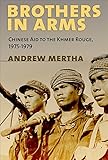Brothers in Arms : Chinese Aid to the Khmer Rouge, 1975–1979 / Andrew C. Mertha.
Material type: TextPublisher: Ithaca, NY : Cornell University Press, [2014]Copyright date: ©2014Description: 1 online resource (192 p.) : 7 halftones, 2 tables, 2 maps, 2 line figuresContent type:
TextPublisher: Ithaca, NY : Cornell University Press, [2014]Copyright date: ©2014Description: 1 online resource (192 p.) : 7 halftones, 2 tables, 2 maps, 2 line figuresContent type: - 9780801470738
- 338.9151059609047 23
- DS554.58.C65 M47 2016
- online - DeGruyter
| Item type | Current library | Call number | URL | Status | Notes | Barcode | |
|---|---|---|---|---|---|---|---|
 eBook
eBook
|
Biblioteca "Angelicum" Pont. Univ. S.Tommaso d'Aquino Nuvola online | online - DeGruyter (Browse shelf(Opens below)) | Online access | Not for loan (Accesso limitato) | Accesso per gli utenti autorizzati / Access for authorized users | (dgr)9780801470738 |
Frontmatter -- Contents -- List of Illustrations -- Acknowledgments -- A Note on Transliteration -- 1. China’s Relations with Democratic Kampuchea -- 2. The Khmer Rouge Bureaucracy -- 3. The Bureaucratic Structure of Chinese Overseas Assistance -- 4. DK Pushback and Military Institutional Integrity -- 5. The Failure of the Kampong Som Petroleum Refinery Project -- 6. China’s Development of Democratic Kampuchean Trade -- 7. What Is Past Is Present -- Notes -- Glossary of Selected Terms -- Index
restricted access online access with authorization star
http://purl.org/coar/access_right/c_16ec
When the Khmer Rouge came to power in Cambodia in 1975, they inherited a war-ravaged and internationally isolated country. Pol Pot’s government espoused the rhetoric of self-reliance, but Democratic Kampuchea was utterly dependent on Chinese foreign aid and technical assistance to survive. Yet in a markedly asymmetrical relationship between a modernizing, nuclear power and a virtually premodern state, China was largely unable to use its power to influence Cambodian politics or policy. In Brothers in Arms, Andrew Mertha traces this surprising lack of influence to variations between the Chinese and Cambodian institutions that administered military aid, technology transfer, and international trade. Today, China’s extensive engagement with the developing world suggests an inexorably rising China in the process of securing a degree of economic and political dominance that was unthinkable even a decade ago. Yet, China’s experience with its first-ever client state suggests that the effectiveness of Chinese foreign aid, and influence that comes with it, is only as good as the institutions that manage the relationship. By focusing on the links between China and Democratic Kampuchea, Mertha peers into the "black box" of Chinese foreign aid to illustrate how domestic institutional fragmentation limits Beijing’s ability to influence the countries that accept its assistance.
Mode of access: Internet via World Wide Web.
In English.
Description based on online resource; title from PDF title page (publisher's Web site, viewed 26. Apr 2024)


